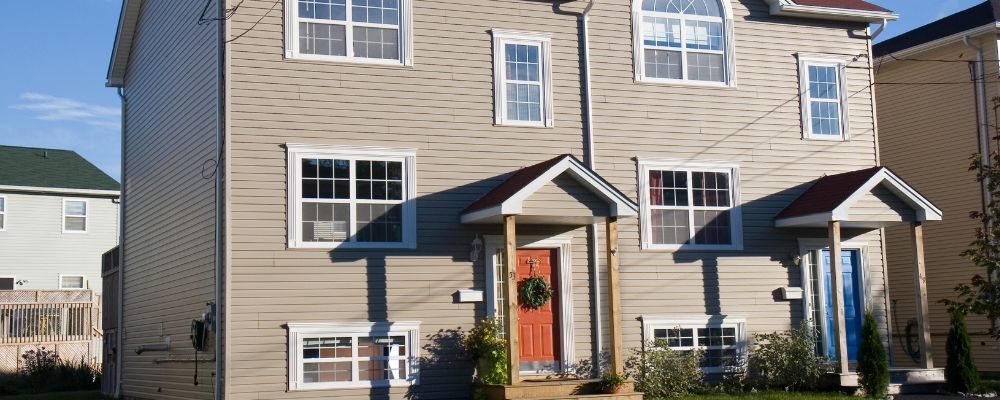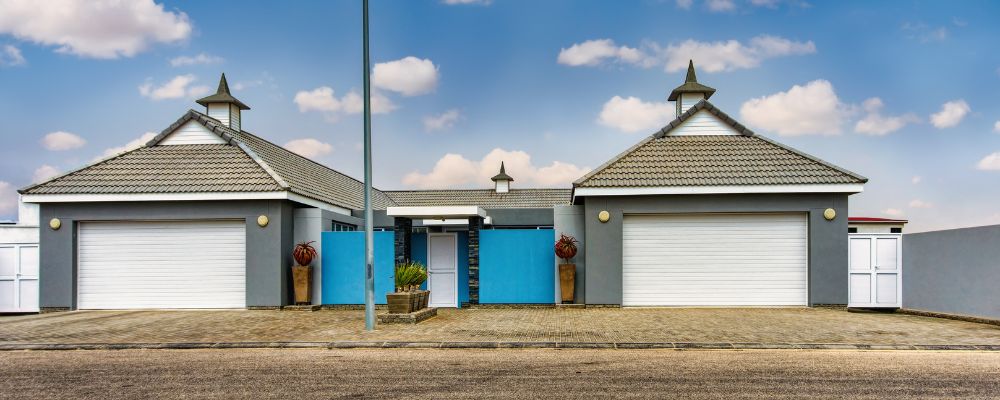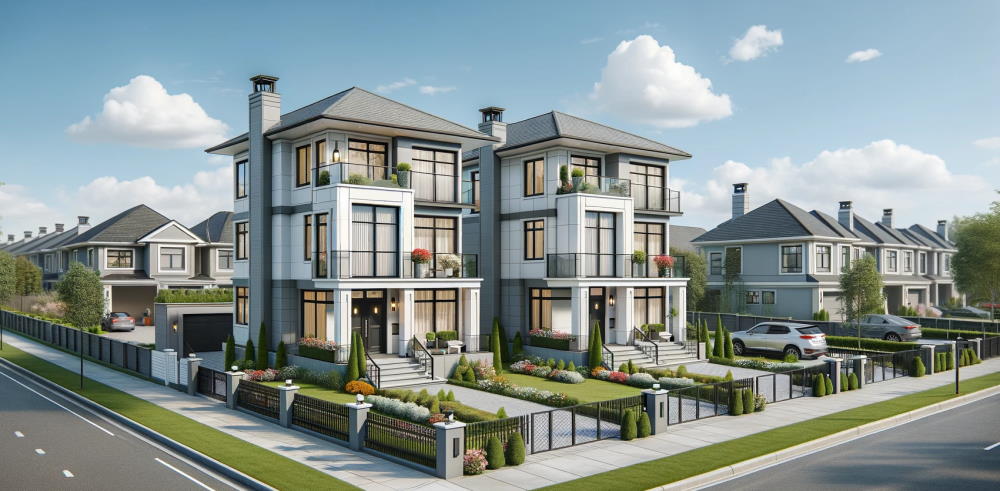A twin home consists of two identical, attached homes on separate lots, each owned independently—much like traditional single-family homes but sharing a wall. A duplex, on the other hand, is a single property with two separate living units on the same lot, typically owned by one person. This key distinction makes duplexes more suitable for house hacking since both units are part of the same property, whereas twin homes require purchasing both sides separately.
Table of Contents
Definition of a Twin Home
Twin homes refer to two identical houses positioned side by side. They share a communal wall but feature separate living spaces.
The floor plan and exterior of the two dwellings often appear indistinguishable, and to the untrained eye, they may look very similar to a duplex. However, there is a difference in the ownership structure that differentiates duplexes from twin homes.
Twin Home vs. Duplex: What's the Difference?

The main difference is that twin homes refer to two identical homes that are conjoined and look similar but are actually on two separate lots. They may be owned and occupied by two different people, no different from typical detached, single-family homes. The only difference is they share a dividing wall and roof.
A duplex is a single property with two separate living spaces on the same lot. Because it is one property, duplexes typically have one owner, even if one or both of the units are rented out to another person or group.
Owning a duplex means you could simply purchase the building a keep one unit for yourself, then use the other to collect rental income. You can also use the same strategy with twin homes; the only difference is you’d have to purchase both properties separately, as they are considered distinct residences.
As a result, a duplex is often a better fit for house hacking, where you live in one unit and rent out the other.
Benefits of a Twin Home

More Affordable Than Other Types of Real estate
One of the biggest advantages of twin homes is the affordability. They are typically cheaper than detached single-family homes because you share a roof and wall with your neighbor. However, they are also cheaper than buying a duplex because you can purchase each unit separately.
Twin homes are a great investment for first-time home buyers who want to save money or investors who are just getting started building their portfolio. They offer many of the same benefits of detached homes with lower costs and less maintenance, which can make them more manageable for first-time buyers.
Separation Between Properties
Twin homes also offer the benefit of having a separation between the two properties, which can be helpful for planning purposes. If you were to buy a duplex, you’d be responsible for keeping both residences filled if you plan on using the rental income to pay the mortgage.
With a twin home, you can decide whether you want to purchase one or both units (if they’re both for sale), depending on your investment strategy. If you choose to purchase both, you can treat them as entirely separate investment properties, which may simplify your taxes and bookkeeping.
Less Maintenance
Twin homes are often easier to maintain because you are only responsible for the side that you own. You likely won’t have the same amount of yard space or interior square footage compared to a single-family home. But you also aren’t responsible for maintaining the entire building (unless you buy both units). That means you only have to worry about your side of the roof, yard or exterior of your own residence, which can significantly reduce the amount of regular upkeep the property requires.
Disadvantages of a Twin Home
Lack of Privacy
One of the major downfalls of twin homes is the potential for noise and lack of privacy. If you plan on living in one of the units, you’ll be right up on top of your neighbors, which can get awkward if you don’t get along. Even if you plan on renting it out, you may encounter problems if your tenants don’t get along with the residents next door. So, you may need to step in if there is ever a conflict that needs to be resolved.
No Control over the Other Property
Unlike a duplex with twin homes, you have no control over the other side unless you purchase both residences simultaneously. That means the neighbor may suddenly decide to paint their home a different color or neglect to keep up with maintenance, potentially impacting the resale value of your investment. You can always have a friendly conversation with them, but unless there is an HOA in the community you can complain to, there’s little you can do if they refuse to comply.
It May Be Hard to Rent
If you’re planning on using the twin home as an investment property, it may be slightly more difficult than renting out a typical apartment or single-family home. Twin homes appeal to a certain type of renter who wants some of the benefits of living in a house without all the upkeep. While those tenants are certainly out there, they are a smaller pool, and you may want to look for real estate agents who can help you find qualified applicants.
Is A Twin Home Considered a Single-Family Home?
Each side of the twin home is considered a distinct single-family home because they are on two separate tax lots and considered a distinct residence. In that sense, it is different from a duplex, which is considered a multifamily home.
With a twin home, both sides will have separate mortgages and pay their own property taxes, just like two neighboring single-family homes. In contrast, with a duplex, you would have one mortgage and property tax bill, even if two different individuals or groups occupy each residence.
That means it may be easier to obtain financing for a twin home because you can get a conventional mortgage, as opposed to multifamily financing, which often has stricter qualifications and restrictions.
How Does A Twin Home Differ From A Townhouse?
Understanding the distinction between twin homes and townhouses is key when navigating the real estate market. These two property types offer unique living arrangements and ownership models.
Townhouse Characteristics
Structure: A townhouse, also known as a townhome, is a multi-story residence attached to a series of similar units. Middle units typically share walls on both sides, while end units share a wall on one side.
Ownership Model: Each unit in a row of townhouses can have a different owner. This style of housing allows for a mix of owner-occupied and rental properties within the same development.
Outdoor Space: Townhouses might come with small outdoor areas, such as a front or back yard. These spaces are generally private but are often more limited compared to standalone homes.
Twin Home Characteristics
Structure: A twin home involves two units that share a single wall. Essentially, it’s like a duplex that consists of two separate homes, each owned individually yet connected.
Ownership Model: In a twin home arrangement, two owners share the overall building. Each is responsible for their side, which includes both the interior and the exterior maintenance.
Outdoor Space: Twin homes usually offer more substantial yard space compared to townhouses, often providing more room for landscaping and outdoor activities.
Final Thoughts: Should You Invest in a Twin Home?
Twin homes can be a great investment for certain types of buyers. They can be a great stepping stone for those who want to own a home but either can’t afford a typical house or simply don’t need all the space.
They are also a great strategy for first time investors who don’t want to deal with the costs and upkeep of a house but also don’t want the added risks of vacancy that come with a multifamily property. They are affordable, manageable and easy to finance which makes them a smart investment for beginners.
However, twin homes also have their downfalls. Unless you purchase both residences, you have no control over what happens in the neighboring property, which can lead to complications. They aren’t as easy to find as other, more common types of real estate, and it may be harder to identify qualified tenants or interested buyers when you want to sell.
So, carefully weigh the pros and cons to ensure you know what you’re getting yourself into and have a solid investment strategy that makes sense for your situation. But for the right type of investor, twin homes offer countless benefits that can’t be overlooked.




